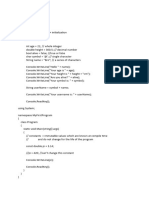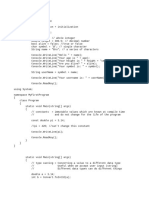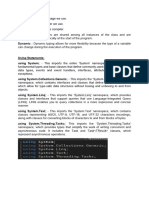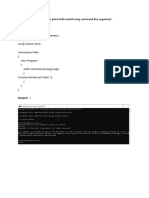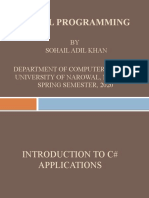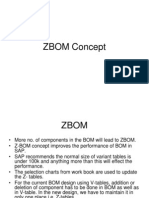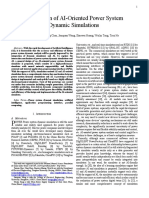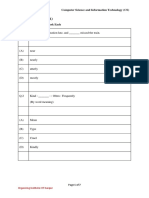DOTNET PRACTICAL 1
Name- Akriti Rajbhar Date- 17 July 2025
Roll no- KCSYCS45
Simple example of C#:
using System;
class
Program
{
static void Main()
{
Console.WriteLine("Welcome to .NET Framework !");
}
}
Example of Data types:
// See https://aka.ms/new-console-template for more information
using System;
using System.Runtime.CompilerServices;
class
Program
{
static void Main()
{
int rollNo = 101;
string studentName = "Akriti";
float percentage = 85.5f;
char grade = 'A';
bool isPassed = true;
Console.WriteLine("Student info:");
Console.WriteLine("Roll no:" +rollNo);
Console.WriteLine("Name:" +studentName);
Console.WriteLine("Percentage: "+percentage);
Console.WriteLine("Grade:" +grade);
Console.WriteLine("Passed:" +isPassed);
}
}
1
� Example of types of operators in C#:
// See https://aka.ms/new-console-template for more information
using System;
using System.Runtime.CompilerServices;
class
Program
{
static void Main()
{
int a = 10, b = 3;
Console.WriteLine("Arithmetic Operators:");
Console.WriteLine("a+b=" +(a+b));
Console.WriteLine("a-b=" + (a - b));
Console.WriteLine("a*b=" + (a * b));
Console.WriteLine("a/b=" + (a / b));
Console.WriteLine("a%b=" + (a % b));
Console.WriteLine("lnReational Operators:");
Console.WriteLine("a==b=" + (a == b));
Console.WriteLine("a>b=" + (a > b));
Console.WriteLine("lnLogical Operators:");
Console.WriteLine("a>5 && b<5 =" + (a > 5 && b < 5));
Console.WriteLine("lnAssignment Operators:");
Console.WriteLine("a after a+=5 =" +a);
}
}
2
� Types of conditional statements:-
1. If statement:
// See https://aka.ms/new-console-template for more information
using System;
using System.Runtime.CompilerServices;
class
Program
{
static void Main()
{
int num = 10;
if (num>5)
{
Console.WriteLine("Number is greatert than 5");
}
}
}
2. If Else statement:
// See https://aka.ms/new-console-template for more information
using System;
using System.Runtime.CompilerServices;
class
Program
{
static void Main()
{
int age = 16;
if (age>=18)
{
Console.WriteLine("You can vote");
}
else
{
Console.WriteLine("You cannot vote");
}
}
}
3
� 3. Else If statement:
// See https://aka.ms/new-console-template for more information
using System;
using System.Runtime.CompilerServices;
class
Program
{
static void Main()
{
int marks = 75;
if (marks >= 90)
{
Console.WriteLine("A");
}
else if (marks >= 60)
{
Console.WriteLine("B");
}
else
{
Console.WriteLine("C")
}
}
}
4. Switch statement:
// See https://aka.ms/new-console-template for more information
using System;
using System.Runtime.CompilerServices;
class
Program
{
static void Main()
{
int day = 3;
switch(day)
{
case 1:
Console.WriteLine("Monday");
break;
case 2:
Console.WriteLine("Tuesday");
break;
case 3:
Console.WriteLine("Wednesday");
break;
case 4:
Console.WriteLine("Thursday");
break;
case 5:
Console.WriteLine("Friday");
4
� break;
default:
Console.WriteLine("Invalid day");
break;
}
}
}
5. Ternary Operator :
using System;
class Program
{
static void Main()
{
int age = 18;
string message = (age >= 18) ? "You can vote." : "You cannot vote.";
Console.WriteLine(message);
}
}
Loops :
1. For Loop:
for(int i=0; i < 5; i++)
Console.WriteLine(i);
5
� 2. While Loop:
int i = 0;
while (i < 5)
{
Console.WriteLine(i);
i++;
}
3. Do-While Loop:
int i = 0;
do
{
Console.WriteLine(i);
i++;
} while (i < 5);
C# - for vs foreach Loop
For Loop Example:
string[] fruits = { "Apple", "Mango", "Banana" };
for (int i = 0; i < fruits.Length; i++)
{
Console.WriteLine("Fruit at index " + i + ": " + fruits[i]);
}
6
� ForEach Loop Example:
using System;
using System.Runtime.CompilerServices;
class
Program
{
static void Main()
{
string[] fruits = { "Apple", "Mango", "Banana" };
foreach (string fruit in fruits)
{
Console.WriteLine("Fruits : " + fruit);
}
}
}
Jump statement:
1. For Break statement:
// See https://aka.ms/new-console-template for more information
using System;
using System.Runtime.CompilerServices;
class
Program
{
static void Main()
{
for (int i=0;i<5;i++)
{
if (i == 3)
break;
Console.WriteLine(i);
}
}
}
7
� 2. For Continue statement:
// See https://aka.ms/new-console-template for more information
using System;
using System.Runtime.CompilerServices;
class
Program
{
static void Main()
{
for (int i = 1; i <= 5; i++)
{
if (i == 3)
continue;
Console.WriteLine(i);
}
}
}
3. Return statement:
// See https://aka.ms/new-console-template for more information
using System;
using System.Runtime.CompilerServices;
class
Program
{
static void ShowMessage()
{
Console.WriteLine("Start");
return;
Console.WriteLine("This won't be printed");
}
static void Main()
{
ShowMessage();
8
� }
}
Types of array statement:
1. Single Dimensional:
// See https://aka.ms/new-console-template for more information
using System;
using System.Runtime.CompilerServices;
class
Program
{
static void Main()
{
int[] numbers = { 1, 2, 3 };
Console.WriteLine(numbers[0]);
}
}
2. Multi Dimensional:
// See https://aka.ms/new-console-template for more information
using System;
using System.Runtime.CompilerServices;
class
Program
{
static void Main()
{
int[,] matrix = { { 1, 2 }, { 3, 4 } };
}
}
3. Jagged Array:
// See https://aka.ms/new-console-template for more information
using System;
using System.Runtime.CompilerServices;
class
Program
9
�{
static void Main()
{
int[][] jaggedArray;
jaggedArray = new int[3][];
jaggedArray[0]=new int[2];
jaggedArray[1] = new int[3];
jaggedArray[2] = new int[1];
Console.WriteLine();
}
}
Strings and String Methods
1. Basic Example of String:
// See https://aka.ms/new-console-template for more information
using System;
using System.Runtime.CompilerServices;
class
Program
{
static void Main()
{
string message = "WElcome to C#";
Console.WriteLine(message);
}
}
2. String Declaration and Initialization:
// See https://aka.ms/new-console-template for more information
using System;
using System.Runtime.CompilerServices;
class
Program
{
static void Main()
{
string str1 = "Hello";
string str2 = new string("World");
Console.WriteLine(str1 + str2);
10
� }
}
Full String Example:
class Program
{
static void Main()
{
string text = " Welcome to C# ";
Console.WriteLine("Original: " + text);
Console.WriteLine("Trimmed: " + text.Trim());
Console.WriteLine("Uppercase: " + text.ToUpper());
Console.WriteLine("Contains 'C#': " + text.Contains("C#"));
Console.WriteLine("Substring(3,5): " + text.Substring(3, 5));
}
}
Objects – Oriented programming concept:-
1. Classes and objects:
// See https://aka.ms/new-console-template for more information
using System;
using System.Runtime.CompilerServices;
public class Car
{
public string Brand;
public void start()
{
Console.WriteLine("Car is starting");
}
}
class Program
{
11
� static void Main()
{
Car myCar = new Car();
myCar.Brand = " Toyota";
Console.WriteLine("Brand" + myCar.Brand);
myCar.start();
}
}
2. Encapsulation and Abstraction :
// See https://aka.ms/new-console-template for more information
using System;
using System.Runtime.CompilerServices;
public class BankAccount
{
private double balance = 100;
public void Deposit(double amount)
{
if (amount < 0)
balance += amount;
}
public double GetBalance()
{
return balance;
}
}
class Program
{
static void Main()
{
BankAccount ac = new BankAccount();
ac.Deposit(500);
Console.WriteLine("Balance :" + ac.GetBalance());
}
}
3. Inheritance :
12
�// See https://aka.ms/new-console-template for more information
using System;
using System.Runtime.CompilerServices;
class Animal
{
public void Eat()
{
Console.WriteLine("Animal is eating");
}
class Dog : Animal
{
public void Bark()
{
Console.WriteLine("Dog is barking");
}
}
class Program
{
static void Main()
{
Dog dog = new Dog();
dog.Eat();
dog.Bark();
}
}
}
4. Constructor :
// See https://aka.ms/new-console-template for more information
using System;
using System.Runtime.CompilerServices;
public class Student
{
public string Name;
public Student(string name)
{
Name = name;
}
class Program
{
static void Main()
{
Student s = new Student("Ravi");
Console.WriteLine(s.Name);
}
}
}
13
� 5. .net core console app:
using System;
class Car
{
public string Model;
public Car(string model)
{
Model = model;
}
public void Drive()
{
Console.WriteLine($"{Model} is driving");
}
}
class Program
{
static void Main(string[] args)
{
Car c1 = new Car("Honda");
c1.Drive();
}
}
14
�15






